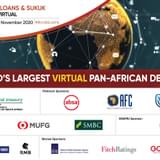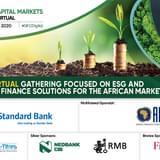Futuregrowth Asset Management, South Africa’s largest fixed income fund manager with ZAR170bn (US$17bn) in assets, has announced it has postponed plans to lend ZAR1.8bn to three state owned companies (SOCs), and will stop lending to 6 SOCs overall, due to concerns over government infighting and threats to the Ministry of Finance.
The SOCs involved include Eskom, Transnet, South African Roads Agency, Land Bank of South Africa, the Industrial Development Corporation of South Africa and the Development Bank of Southern Africa.
Jyske Bank, which manages US$1.3bn, also followed Futuregrowth in suspending funding to Eskom.
The rand was heading for its weakest closing level since July 7 and that the yields on Eskom and Transnet’s bonds have risen following the announcement, according to data from Bloomberg. The rand currently stands at 14.0221 to the US dollar.
Some fund managers weren’t phased by the recent developments.
“We apply a rigorous process when making all investment decisions, including funding for state-owned enterprises, and will continue to do so and monitor all developments in this regard going forward,” said Ian Kirk, CEO of Sanlam Investments.
Although there are concerns over government infighting, Rowan Williams-Short, portfolio manager at Vunani Fund Managers, which will not withhold funding for South African SOCs, suggested those concerns have largely been blown out of proportion.
“Furthermore, recent weakness in South African bonds and the rand cannot be solely attributed to Futuregrowth’s announcement. There have also been press announcements regarding cross allegations in terms of threats posed to the Ministry of Finance.”
In addition, Futuregrowth’s holdings of South African SOC debt pale in comparison to that of other creditors, meaning that the impact of the company’s decision is likely to be relatively muted.
In a press release, the Ministry of Public Enterprises noted that Futuregrowth’s direct exposure to Eskom and Transnet’s debt amounts to ZAR10bn, whilst both companies have collectively raised ZAR470bn from other financial institutions.
A statement from Transnet noted that Futuregrowth’s holdings of the company’s debt amounts to 1.25% of its total borrowings.
Eskom noted that Futuregrowth holds ZAR4.6bn in Eskom paper, whereas the sum total exposure to Eskom bonds by the whole Old Mutual Group, including Futuregrowth, is over ZAR11bn. Old Mutual has distanced itself from its subsidiary’s announcement.
According to data from Rand Merchant Bank (RMB), the PIC, the civil servant pension fund and the biggest asset manager in the country, manages 77% of all SOC bonds on its own.
“I do not think that Futuregrowth’s announcement will have a meaningful impact on any SOCs ability to find funding due to the amount held by other players – there may be an impact however if things were to worsen regarding infighting and corporate governance or were transparency to get worse,” Williams-Short said.
Both Fitch and S&P Global Ratings have voiced concerns over how SOCs are being managed in the country.
Williams-Short added however that Futuregrowth’s statement may actually make all SOCs work harder on improving their corporate governance and transparency.
“SOCs will take some fright from this so it could have a beneficial outcome in that respect.”
Although there is good reason to improve corporate governance and transparency to ease investor concerns, many SOCs, notably Eskom, are increasingly turning towards funding from DFIs, ECAs or Chinese loans, such as from entities like the China Development Bank.
“If we were to issue a Eurobond today, I’m fairly certain we would be able to achieve it and that there would be significant appetite. But there is a cost there… There are alternatives available to us including financing from stakeholders like DFIs and ECAs that we can tap quite easily,” said Eskom’s CFO Anoj Singh in an interview with Bonds & Loans earlier this year.
Although such credit lines dwarf those from Futuregrowth or other entities, questions arise over how wise it is to have significant FX-denominated credit lines in the current environment.
“These SOCs do not have meaningful revenues in foreign currencies and hedging could be expensive so we are not wholly supportive of them borrowing offshore,” Williams-Short noted, meaning rand-denominated paper would be more appealing.
He added that the yield on Eskom or Transnet bonds over similar-duration government paper is still relatively satisfactory.
“A lot of Eskom’s bonds are explicitly government guaranteed, and furthermore, most of the SOCs are critical to the functioning of the country – it is not conceivable to me that they would be allowed to default on their debt. Most bonds are therefore if not de jure guaranteed, at least de facto guaranteed.”
“It is less risky to borrow from the local markets because there is no currency mismatch,” he continued.
If such entities begin to struggle to meet their own funding needs, there could be wide ranging repercussions for the government despite their backing.
The greater risk is if these entities reach a point where they struggle to fund their borrowing requirements, as they have only one recourse which is to solicit government guarantees. This is a risky policy as it will raise the contingent liabilities of the government itself to the point that its own funding would become more expensive, and will enhance the probability of a downgrade.”









